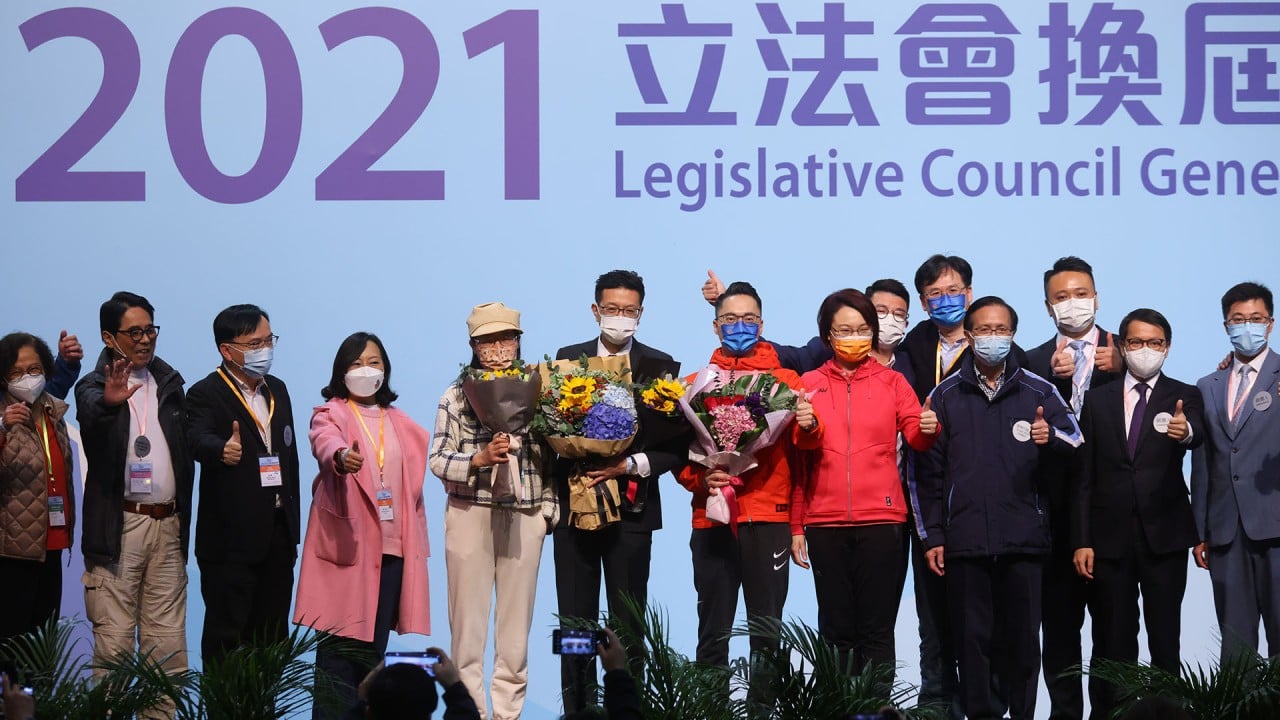
Hong Kong leader Carrie Lam oversees swearing in of 90 new lawmakers, launching first Legislative Council of ‘patriots-only’ era
- Proceedings pass without any of the improper oath-taking antics of the 2016 ceremony, though two lawmakers-elect ordered to repeat their vows over missing words
- The 90 politicians pledge in front of Lam and the national flag to uphold Hong Kong’s mini-constitution and laws
The city’s red-and-white emblem featuring the bauhinia flower that is usually displayed in the Legislative Council chamber was replaced by a national one for the ceremony, which began with lawmakers facing the five-star and bauhinia flags as they sang the country’s anthem.
The Legco secretariat later confirmed that the national emblem would remain in the chamber, while the city’s bauhinia insignia would be displayed below it.

The decision was jointly made by three leading lawmakers from the legislature’s previous term, namely Legco president Andrew Leung Kwan-yuen, house committee chairwoman Starry Lee Wai-king and Lee’s deputy Ma Fung-kwok.
Speaking to the media after the ceremony, the lawmakers said they would work closely with the government to adopt policies that would help improve residents’ livelihoods, boost young people’s upward social mobility and the city’s economic recovery, and advance technological innovation.
They would also help authorities safeguard national security in the global financial hub.
In separate statements, the State Council’s Hong Kong and Macau Affairs Office (HKMAO) and the central government’s liaison office in the city said they expected Legco to create a brighter future for the city, under the chief executive’s leadership.
“We would like to congratulate the lawmakers on taking their offices … We hope that they will serve the city, contribute to the nation … and win people’s trust with results,” the HKMAO spokesman said.
Hong Kong poll numbers show pro-Beijing bloc’s biggest backers live in public housing
Leung, Legco’s chief in the previous term, was expected to seek re-election in the presidential poll next Monday, two days before city leader Lam was slated to address the 90 lawmakers in the council’s first meeting on January 12.
In a statement issued on Monday evening, the government said Lam had determined that the oaths taken by all 90 lawmakers were valid.
The lawmakers-elect took their oaths of allegiance on Monday morning facing the national emblem in the Legco chamber, vowing to uphold the Basic Law, Hong Kong’s mini-constitution, and swear allegiance to the city.
Newcomers and veterans made their pledges in order of seniority, with only two told to repeat their vows after each missed out a word.

Proceedings passed without much incident, in contrast to the drama of the ceremony about five years ago during which some opposition lawmakers infused their oaths with anti-China sentiments, resulting in six being unseated.
The two lawmakers ordered by Legco secretary general Kenneth Chen Wei-on to take their oaths again were Tik Chi-yuen, the only centrist to win a seat, and the Federation of Trade Unions’ Michael Luk Chung-hung.
Luk omitted the word “member” from the vow, while Tik missed out “Hong Kong” from his. Both repeated their oaths without any issue.
Veteran pro-establishment lawmaker Gary Chan Hak-kan did not raise his right hand as is customary when taking the oath, but Chen did not take issue with that. Chan said he later confirmed with authorities that his oath was valid.
“I was sincere and accurate in taking my vow fully and solemnly, the law did not require us to raise our hand,” he said.
Big parties sidelined as Legco’s pro-Beijing novices plan new alliances
The 90 legislators also gathered at the main lobby of the Legco complex for a group photo, and 12 of them addressed the media on their coming plans.
Anglican priest Reverend Canon Peter Koon Ho-ming, who was elected in the 40-member Election Committee sector, said he would step down as secretary general of the Sheng Kung Hui, as the church was known in Hong Kong, to focus on his new responsibilities.
“I will resign from my administrative work at the church, and work with other lawmakers in serving the people,” he said.
Re-elected legislator Elizabeth Quat, from the Democratic Alliance for the Betterment and Progress of Hong Kong, formed a group with newly elected lawmakers Chan Siu-hung, managing director of electricity company China Light and Power, and Andrew Lam Siu-lo, former head of the Antiquities Advisory Board to promote smart living – the use of new technology to improve residents’ lives.
Under last year’s Beijing-decreed electoral revamp, the legislature was expanded from 70 to 90 seats, with 40 returning through the Election Committee constituency and 30 from the functional constituencies. But the number of directly elected lawmakers in the geographical constituencies was slashed from 35 to 20.
Previously in October 2016, pro-independence lawmakers-elect Sixtus Baggio Leung Chung-hang and Yau Wai-ching, along with four others, were found to have failed to properly take their oaths of office, with some working anti-China slurs into the wording. At the time, the process was overseen by Kenneth Chen.
Their antics prompted Beijing to issue an interpretation of the Basic Law in November 2016 that made insincere oath-taking an offence punishable by immediate disqualification.




